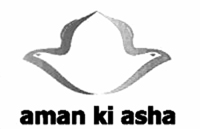 |
| Photo by Reuters |
Aman ki Asha, a peace initiative started by the Jang Group and Times of India, is celebrating its second anniversary. The campaign has had its presence felt in the media throughout, with events like holding a welcome lunch for Aisam-ul-Haq in Karachi after he reached the Grand Slam final in September 2010.
A Baton Relay and Peace Chain was made in June last year, along with a Hakies Peace chain which required schoolchildren to send messages of peace across border. A series of seminars were also held in April last year to have a deeper look at the problems and a "Talking Peace" conference in Karachi the same month, to discuss public interaction and media issues. In March, an Indo-Pak mushaira (poetry recital) took place in March.
"Aman ki Asha is a brave and a very correct step in the direction of encouraging peace and harmony between India and Pakistan," says Parijat Kaul, a Delhi based filmmaker.
"And perhaps peace can be achieved only by the youth of the two countries. Like "asha" (hope), the word youth is also indicative of future. The two go hand in hand. Both denote change from current situation. Both offer change for the better. Youth of both the countries will certainly benefit from this programme and look for ways to contact each other across the border and work together to create a larger audience for peace and harmony," says Parijat.
"If the two countries can understand the meaning of peace," says a 19-year old Abha Sharma, a law student at the Punjab University, Chandigarh, "They can stop killing each other and causing bloodshed. Maybe then these people can become doctors, lawyers, and engineers rather than dying in the battlefield."
 Bollywood movies are very popular in Pakistan and this gives producers the benefit of exploring a market here. Pakistan’s own film industry has been battling a downfall since the last three decades now, and though the competition in the Indian market is immense, Lollywood can definitely benefit by getting its post and pre-production work done in India where the level of expertise is much higher than here. There is ample room for technical training for not only Pakistani films’ technical staff but also other media like news channels and television industry. There is, of course, room for greater technical co operation on both sides.
Bollywood movies are very popular in Pakistan and this gives producers the benefit of exploring a market here. Pakistan’s own film industry has been battling a downfall since the last three decades now, and though the competition in the Indian market is immense, Lollywood can definitely benefit by getting its post and pre-production work done in India where the level of expertise is much higher than here. There is ample room for technical training for not only Pakistani films’ technical staff but also other media like news channels and television industry. There is, of course, room for greater technical co operation on both sides.
"Aman ki Asha is a great initiative and important for our region to learn to co-exist. There should be more such cultural, business, and social exchange," says Ali Saleem of Begum Nawazish Ali fame who recently tested his luck in the reality show Big Boss, based in India. "However, it has not made much difference in showbiz and this is sad because Indian flicks are allowed here but artists cannot easily find work in the market across border. Often, there is a visa issue and they are not allowed to cross borders."
Pakistan has many economic strains. Yet the economy next door is working a lot better, with an immense scope for economic co-operation and trade. This is why a small but representative group of Indian CEOs and VPs traveled to Lahore and Karachi in early December 2010 to participate in discussions with the members of the IT community in the two cities.
"There is a market for products on both the sides, but the Indian market is of course eight times larger. This is basic economics that whenever there is trade, investments, and jobs, etc, between two countries, it will generate prosperity, "says Amin Hashwani, the CEO of Pakistan India Business Forum. "SAARC has little trade as compared to EU or ASEAN, which have four to six-fold more trade among themselves. And this Indo-Pak trade is stagnated due to the politics. The civil society can play a major role in building an atmosphere of peace."
But people like Parijat Kaul are more skeptical. "While there is much scope now for people-to-people contact, the movement Aman Ki Asha may not directly benefit trade. We cannot cooperate in the trade and economy matters ranging from trade of onions to transportation of crude oil and buying and selling power. However, it surely can create ground for increased discussion between the two nations on issues related to trade and commerce," Parijat says.
"We business people are problem-solvers on a daily basis," adds Hashwani. "Though the level of skills in Pakistan’s IT sector equals that of India the labour here is much cheaper. Similarly, Pakistani minerals like marble and agricultural products like cotton have a huge market and competitive advantage in India but trade barriers are hampering this traffic," he says.
The two countries are among the most densely populated regions in the world. It is all the more important that there be peace between the two nations. We share a common culture, natural resources, river basins, history and even problems like unemployment, poverty and illiteracy. It is hoped the two countries learn to resolve these issues together with the help of platforms like Aman ki Asha.
This piece was first published in The News in January 2011.
No comments:
Post a Comment